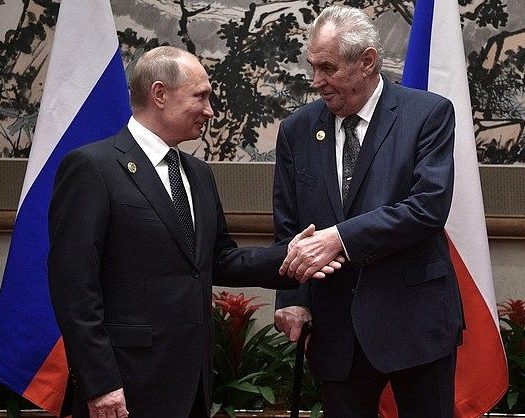Czech President Milos Zeman gets into a tussle with the country’s intelligence and runs the risk of breaking up Prague-NATO contacts in intelligence-sharing.
Czech President Milos Zeman, selling his too-friendly relations with Putin’s Russia, requested the Security Information Service (BIS) to supply him with the names of Russian spies active in the Czech Republic.
The President called on the intelligence agency to provide him with documentation on three issues: influence and infiltration operations by Russian intelligence; Russian spies in the Czech Republic, as well as their collaborators, and alleged money laundering by Russian organized crime in the Czech Republic.
If this information is published or leaked from Zeman’s office (and the chance is quite high), that will undermine the country’s national security.
The operational security demands a very high level of ‘need to know’ principle. The identities of surveillance targets, the sources are treated as extremely confidential.
Pavel Fischer, a member of the Senate’s Security Committee, said that this represented a potential threat to national security.
But Zeman’s request might stem from his personal conflict with the head of BIS. Five times Zeman has refused to promote Koudelka to the rank of general, despite the government’s urging.
In October, the BIS released its latest annual report, in which it addressed the way the Russians seek to bring influence to bear within the Czech Republic, through both their extensive networks of intelligence assets and also “proxies”.
However, one may put aside the story that Zeman made his request to the BIS so that Moscow could regain its face in public. It is impossible, as Russian intelligence has been involved in controversy in the Czech Republic several times for the last few years. The investigation findings were aired in the Czech parliament.
Meanwhile, submitting a request impossible to be answered by the Czech intelligence without undermining the state security, Zeman may figure out that the refusal to grant the request empowers him to mistrust the reports by BIS and question the competence of its leader. This scenario meets Moscow’s interests.
In October 2019, the head of the Czech intelligence says a Russian espionage network that his agency dismantled in 2018 was meant to be used for cyberattacks against the Czech Republic and its foreign allies.
The US State Department stated that the United States notes with concern the warning from the Czech Republic’s National Cyber and Information Security Agency of a ‘real threat of serious cyber attacks’ against its healthcare sector.
Among other Russian cyber operations that BIS has disclosed is the compromising of private email accounts belonging to members of the Czech Armed Forces, in order to gather compromising material on individual soldiers.
The intelligence agency suspects the attack was most likely carried out by the Russian APT28 (GRU affiliated) cyberespionage campaign.
Michal Koudelka told a security conference in the lower house of parliament that the Security Information Service (BIS) cooperated with the police’s organized-crime unit to completely paralyze the network.
According to Koudelka, the network was completely dismantled and destroyed. Russia’s Federal Security Service (FSB), supported by the Russian Embassy in Prague, was suspected of being the mastermind. It was created by people with links to Russian intelligence services and financed from Russia and the Russian Embassy, Koudelka claimed. Koudelka also pointed to the Russian and Chinese spy services as the biggest threats to his country.
The Russian state has a very well-established base in the Czech Republic and Czech intelligence has long been pointing to the fact that the diplomatic mission of the Russian Federation is oversized.
Located in a massive villa in Prague’s Bubeneč neighbourhood, the Russian Embassy and the surrounding buildings related to the Russian mission are sometimes nicknamed the ‘little Kremlin’ by locals.
The Czech newspapers Deník N stated that the embassy also administers hundreds of flats in the capital.
According to journalist Ondřej Kundra from the weekly magazine Respekt, the origins of a strong Russian intelligence base in the country stretch back to the 1960s era of the Prague Spring movement in Czechoslovakia. A powerful SVR station is active at the embassy in Prague. The station in Prague was the first for Central and Eastern Europe in 1960, so it reaps the benefits of the longest and deepest infiltration in the area.
Stereotypes and the financial limitations of Czech intelligence also play a role in the popularity of Prague for Russian spies. Despite its good efforts, the Czech intelligence service (BIS) is not big enough and its budget is too small, so the Russians know that not all of their agents can be under BIS surveillance.
They also think that, as a Slavic nation, Czechs are very similar to Russians and that therefore they completely understand Czech citizens.
This large spy and diplomatic presence is important, because according to BIS “Russian intelligence and non-intelligence entities can exchange roles and functions, and so any authority (or its subordinate agency) can be used for intelligence operations or for their cover”.
Despite this versatility, the Czech intelligence service noted that there were operatives as well as associates of all the Russian intelligence services in the Czech Republic in 2018. This April, Jakub Janda, Executive Director of Prague-based Center for Security Policy reported that a Russian military intelligence officer (Andrei Konchakov who is also the director of the Russian Center for Science and Culture in Prague) flew to Prague from where he was transported by diplomatic vehicle to the Russian Embassy in the Czech Republic. On recent reports of the Czech security services, he brought chemical poison ‘ricin’ to assassinate the mayor of Prague, Ondřej Kolář.
So Russia keeps practicing political terrorism by murdering foreign political figures and Russian citizens with the help of poison.
Intelligence officers attempted to cultivate contacts and establish influence around politicians who can impact Russian interests.
BIS says the main threat to the Czech state came from Russia’s so-called hybrid warfare operations, traditionally aimed at NATO and the Czech Republic as a member state.
One of the serious problems in the area of protecting the constitutionality and the democratic foundations of the Czech state are Pro-Russian Activists. They are individuals who through their activities wittingly or unwittingly directly assist a foreign power.
Primarily through misleading, manipulative or false statements (disinformation campaign and psy Ops) spread on the “internet, social networks, their own internet video channels or the so-called independent/alternative media” pro-Russian activists divide and polarize society, according to Czech intelligence. With their help Russia can draw on a segment of the Czech population which sympathizes with the policies of Russia’s current government.
The Czech Republic was also a scene for Russian subversion activity aimed at the sovereignty and territorial integrity of other states.
According to the former Czech Military Intelligence chief Andor Šándor, Russia is not a current military threat to this country or Europe, but it is a security threat to our country and to Europe. He claimed that both the GRU [Main Intelligence Directorate; military intelligence] and the SVR [Foreign Intelligence Service] were involved in spy Russia’s activity in Czech Republic.





